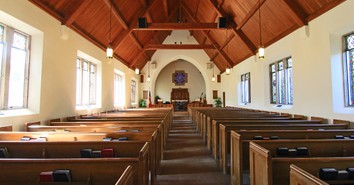Bruised by Booze: The Faithful Response to Addiction & Recovery

NEW YORK -- At 10:30 p.m., after a drive upstate to look at colleges, I returned a borrowed car to Greenwich Village, threaded my way through reeling and raucous revelers, and boarded the subway for home.
A couple got on around 14th Street. She had dressed nicely for an evening out. He was wasted, talking to himself with jerky hand motions and nodding off. She looked resigned to another evening lost to drinks or drugs.
At 96th and Broadway, I found myself amid a sad display of people staggering this way and that. Night people, college students, young professionals, all lurching in the rain, like something out of a Federico Fellini film.
What a contrast to our serene two days visiting colleges in small towns and scenic valleys. And yet, not a contrast.
Alcohol and drugs were everywhere. In addition to describing academic opportunities -- which sounded wonderful -- tour guides stressed the presence of state police, city police and campus police, and described alcohol and drug policies in detail and the consequences for violating them.
Even so, both college towns brimmed with bars. In one, noisy weekend tippling was well under way when we arrived for a tour -- at 11:00 a.m.
We stopped for the night in Corning and marveled at their success in preserving a main drag from the glass-making center's post-war heyday.
Then we noticed that every other storefront was a tavern. Steady streams of retirees and college students were pouring in.
You can't live anywhere in America and not be aware of the overwhelming impact that alcohol and drugs are having on our society. In one community after another, another generation is being decimated by binge drinking, marijuana laced with heroin, straight heroin, prescription drugs and crystal meth.
One pastor active in recovery sees a fundamental crippling of the American work force. The economic cost of addictions is nearing $500 billion a year. Throughout America, weekend partying fills emergency rooms and morgues with drunk drivers, overdose victims, and rape victims. Close to 25 percent of all Medicare and Medicaid expenses stem from substance abuse.
If we want to see God at work in our communities, I think we need to examine these lives that are being lost to self-destruction.
It's fine for congregations to put on concerts, to continue nice traditions from earlier days, to undertake symbolic gestures toward equitable distribution of privileges, and to gather in daylight for spirited arguments about sexuality.
But if we are to serve God's creation as it is today, we need to see and risk being disturbed by an epidemic of addiction. Some tipping point has been reached, and our cities and towns are spinning wildly into self-destruction.
We must respond to it as faith communities. Faith isn't about digging a moat around one's own life.
I am helping some brave folks at a church on Manhattan's Upper East Side to launch a recovery ministry. I don't mean an annual Alcohol Awareness Sunday with special sermon and singing "Just as I Am." I don't mean just allowing 12-Step groups to use basement rooms when no one else needs them.
I mean opening all aspects of church life to addicts who are seeking recovery, bridging the chasm of distrust between religion and recovery communities, walking together into sobriety and sanity.
Across the country, faith communities are risking a fundamental reorientation of religious life to make a difference, a one-day-at-a-time, one-life-at-a-time difference in a society caught in the death spiral of addiction.
Tom Ehrich is a writer, church consultant and Episcopal priest based in New York. He is the author of "Just Wondering, Jesus," and the founder of the Church Wellness Project, www.churchwellness.com. His Web site is www.morningwalkmedia.com.
Copyright 2009 Religion News Service. All rights reserved. Used with permission.
Original publication date: September 30, 2009
Originally published September 29, 2009.







